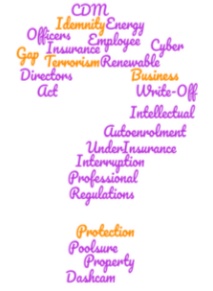Video evidence in the event of an accident
What are Dash Cams?
Also called Witness Cameras, they are recording systems to provide video evidence if you are involved in an accident. Most just have front view cameras, although rear view cameras are also available.
What are the benefits of Dash Cams to you?
The main advantage is that the film footage can help establish innocence if you are involved in an accident, which in turn can protect your no claims bonus or fleet discount, assist with the recovery of your excess and help avoid increased premiums.
The availability of film footage should speed up the claims process.
Some insurers offer a discount off their premiums (generally up to 10%).
Cameras can change driver behaviour, as people tend to drive more carefully if they know their actions are recorded, resulting in safer driving and less accidents.
There are also wider benefits; safer driving is associated with improved fuel economy and reduced wear and tear on vehicles.
Cameras can help identify hit and run offenders and offer protection against fraudulent ‘crash for cash’ scammers.
What are the benefits of Dash Cams to Insurers?
Whether the footage helps to defend a claim or establishes their driver was at fault, either way, it is beneficial if it avoids arguments and legal action. If claims are dealt with more efficiently it reduces their costs.
Film footage helps with accident recollection, as many driver’s memory of exactly what happened can be quite sketchy after an accident.
Insurers like drivers who are prepared to have their driving recorded feeling they will drive more carefully and be better risks.
Systems that record speed at the time of the accident can help combat fraudulent or exaggerated whiplash claims.
The cost of Dash Cams and the insurance discounts and contributions available.
Typically the units start from around £175 including VAT, with professional fitting extra, so if you have just one or two cars or vans, an insurance discount of up to 10% means that you should look at the value of Dash Cams over a long term, but fleet operators may see a quicker and perhaps even an immediate return.
Anything that helps to improve the claims experience on a fleet will be reflected in reducing or at least maintaining lower insurance cost and some insurers may also have risk management funds to contribute towards the cost of the cameras.
For our customers in the Sussex area, Huets The In-Car Specialists based in Shoreham will offer a discount price off their Dash Cam products. Please mention our name when you contact them.
What to check?
If you are considering a Dash Cam, it is worth checking if your insurer offers a discount and if so, whether a particular type or specification is needed. You will be required to share the film footage with the insurer if you accept their discount.
What types are there?
They can be portable or hard wired, and fairly basic or more sophisticated models to include GPS technology for location and speed recording (which can help combat fraudulent or exaggerated whiplash claims), sensors to pick up the impact and automatically move the recording to a separate file to ensure it is not over recorded. Others can be connected with smart phone technology and some still operate when a vehicle is parked to aid security.
Are they any downsides?
You do see some Dash Cams in the middle of windscreens that must obscure the driver’s vision, however this can be minimised with professional advice or professional fitting.
Many will be concerned about the ‘Big Brother’ aspect and data protection issues, but Dash Cams are perfectly legal in the UK, although their use is restricted in other countries, with a complete ban in Austria and it is illegal to use footage on line in a number of other countries.
The Future
Cameras are already available to aid reversing and help avoid blind spots, (especially on larger vehicles) with some coaches and taxis also using internal cameras to record both the behaviour of passengers and what happened to them in the event of an accident. Looking ahead, the likelihood is camera, tracking and monitoring technology will form part of a comprehensive ‘all seeing’ telematics system which will gradually become a standard feature on most vehicles and will be another step towards driverless cars.
For more information please speak to your usual Nsure contact on 01903 520200 or email phil.bristow@nsure.co.uk
Click here to download a copy of this factsheet

